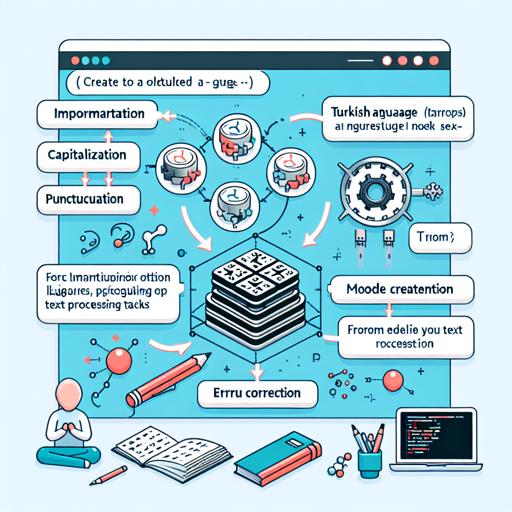Welcome to this guide on how to implement a Turkish language model using BERT for text processing tasks like capitalization and punctuation correction. This reader-friendly approach ensures you’ll be well-prepared to tackle any text data you acquire in Turkish.
Overview of Turkish BERT Models
The code provided enables you to utilize BERT models specifically trained on Turkish text. This functionality can enhance text quality by fixing capitalization issues and punctuation errors. Whether you’re cleaning up a casual tweet or preparing documents for analysis, these tools are invaluable.
Example Usage
To create a program that enhances Turkish text, you can follow these steps:
- Import the required libraries.
- Create a preprocess function that cleans up the input text.
- Set up the models for capitalization and punctuation correction.
- Input your text and execute the
end2endfunction to see the results.
Step-by-Step Explanation
Imagine you are sending a handwritten letter and want it to look perfect before delivery. You first erase any parts that don’t look neat (preprocessing), then improve the clarity of your writing (capitalization correction), and finally make sure every sentence ends correctly with punctuation (punctuation correction).
This analogy helps illustrate how the processes in the code ensure your text appears polished before sharing, much like ensuring your letter is free of any smudges or errors.
from transformers import pipeline, AutoTokenizer, BertForTokenClassification
def preprocess(text):
noktalama_isaretleri = ['!', '?', '.', ',', '-', ':', ';', "'"]
new_text = "".join(
[char for char in text if char in noktalama_isaretleri or char.isalnum() or char.isspace()])
new_text_Pure = "".join([char for char in text if char.isalnum() or char.isspace() or char == "'" or char == "-"])
new_text_Pure = new_text_Pure.replace("'", " ").replace("-", " ")
new_text = new_text_Pure.replace("I", "ı").lower()
return new_text
def end2end(sent, capitalization_corr, punc_corr):
p_sent = preprocess(sent)
r1 = capitalization_corr(p_sent)
r2 = punc_corr(p_sent)
tokenized_sent = tokenizer.tokenize(p_sent)
final_sent = ''
i = 0
while i < len(tokenized_sent):
token = tokenized_sent[i]
if r1[i]['entity'] == 'one':
token = token.capitalize()
elif r1[i]['entity'] == 'cap':
token = token.upper()
while tokenized_sent[i + 1].startswith("##"):
token += tokenized_sent[i + 1][2:].upper()
i += 1
if r2[i]['entity'] != 'non':
token += r2[i]['entity']
if r2[i]['entity'] != "'":
token += ' '
final_sent += token
i += 1
final_sent = final_sent.replace(' ##', '')
return final_sent
Running the Code
Now that you understand the code basics, here's how to implement it:
- Input your Turkish sentence into the
sentvariable. - Run the
end2endfunction. - Observe the output, which has corrected the sentence!
Troubleshooting Guide
As you work on your project, you may encounter some issues. Here are a few troubleshooting tips:
- Issue: The output sentence isn't structured correctly.
- Solution: Double-check the preprocessing function to ensure it correctly formats your text prior to passing it to the model.
- Issue: Models do not load properly.
- Solution: Make sure you have an active internet connection, as the models need to be downloaded for the first time.
- Issue: Unexpected characters in the output.
- Solution: Review your input string for any unusual punctuation marks or symbols that might not be handled by the preprocess function.
For more insights, updates, or to collaborate on AI development projects, stay connected with fxis.ai.
Closing Thoughts
Embracing such technological advancements not only enriches your projects but also contributes to the evolution of language models. At fxis.ai, we believe that such advancements are crucial for the future of AI, as they enable more comprehensive and effective solutions. Our team is continually exploring new methodologies to push the envelope in artificial intelligence, ensuring that our clients benefit from the latest technological innovations.
Final Note
Now you’re equipped with the knowledge to effectively use Turkish BERT models for your text processing needs. Happy coding!

